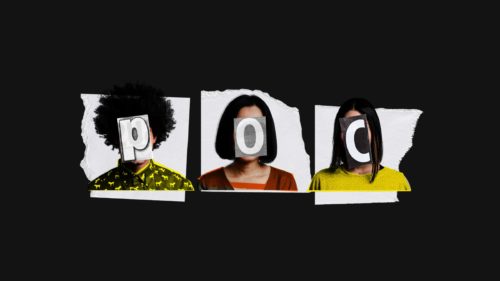What We Get Wrong About ‘People of Color’
Share
Explore Our Galleries
Breaking News!
Today's news and culture by Black and other reporters in the Black and mainstream media.
Ways to Support ABHM?
The phrase turns a plural into a singular, an action that betrays all the ways we have come to understand contemporary identity.

Illustration: Elena Lacey; Getty Images
By Jason Parham, wired.com
In October, to promote an op-ed on the best ways to bring about legislative marijuana reform, Senator Kamala Harris posted a bland extract of her proposal on Twitter. “We must legalize marijuana the right way,” she wrote. “That means correcting failed drug policies that disproportionately hurt people of color, & creating new opportunities for people of color to participate in the industry.” There was just one problem with the tweet: Harris meant to say black people.
It wasn’t people of color, that idiomatic casserole of cultures and identities, it was black people—and black men in particular, if we really want to talk about what we should be talking about—who were undercut by those unevenly distributed drug laws. (Even as incarceration rates have dropped nationwide, blacks remain the most at risk to be sentenced.) As San Francisco’s district attorney and later as attorney general of California, Harris was part of that enforcement—another point she conveniently brushes aside. In 2012, she literally laughed at the thought of legalizing marijuana.
But this is America, where amnesia is a convenient tool of the politically aspirant. Harris counts herself among a dozen Democratic hopefuls trying to remove a power-tipsy Donald Trump from his presidential seat in 2020. In the op-ed, she wrote about wanting to do the “smart thing, the right thing,” expressing that it was critical to “add measures to correct the historical injustices.” She wanted, she said, to help reverse the impact of hurt on “communities of color.” The points were valid, however vague or late or politically well-timed, but mostly they were beside the larger point. Like so many of her contemporaries, Harris’ cultural corralling—tacking on the very unspecific modifier “of color” without explicitly detailing which “people” or what “communities”—is what ultimately spoke volume…
Read full article here
More Breaking News here
View more ABHM galleries here
More about Derrick Bell here and here
Space Traders https://www.youtube.com/watch?v=y6-n9axdiOs









Comments Are Welcome
Note: We moderate submissions in order to create a space for meaningful dialogue, a space where museum visitors – adults and youth –– can exchange informed, thoughtful, and relevant comments that add value to our exhibits.
Racial slurs, personal attacks, obscenity, profanity, and SHOUTING do not meet the above standard. Such comments are posted in the exhibit Hateful Speech. Commercial promotions, impersonations, and incoherent comments likewise fail to meet our goals, so will not be posted. Submissions longer than 120 words will be shortened.
See our full Comments Policy here.